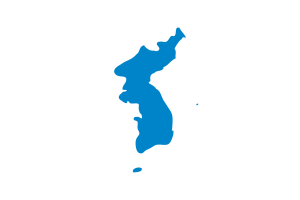The Unification of Korea

Since the end of WWII in 1945, the Korean peninsula was divided into a northern area, protected by the Soviets, and a southern area protected primarily by the United States. In 1948, when the powers failed to agree on the formation of a single government, this partition became the modern states of North and South Korea. The failure to come to an agreement has forever impacted the history of the Korean peninsula.
At the 2018 Winter Olympic opening ceremony, the whole world watched as South and North Korea entered the Olympic stadium under a single flag representing the United Korean Peninsula. Later, two women from South and North Korea ran together on the way to ignite the Olympic torch. The two countries even had a combined women’s hockey team at Pyeongchang. Are all of these acts indicative of sincere hope and intention by both parties to unite as a single country?
In the past few years we have heard incessant news about the actions of North Korea and its dictator Kim Jong Un. Kim Jong Un aka “Rocket Man” conducted numerous rocket testings for reach capabilities of missiles aiming for America’s main land. This policy is the direct opposite of South Korea’s role as a major ally of the United States in Eastern Asia. In addition North Korea pompously displayed their military powers to the world by organizing military parades. The parades are so ubiquitous that their significance is often laughable. Due to their previous actions, it is hard to believe that North Korea’s intentions are genuine. Perhaps it is their duplicitousness. It is most likely that they are displaying outward kindness as propaganda to cover up their horrific human rights violations and to gain the benefits of economic support from South Korea and other countries.
The public atmosphere of South Korea is another limiting factor in the unification. Many young generations of South Koreans do not believe that South and North Korea have a chance of unification. They believe that two countries are too greatly different in many aspects. South Korea is a technologically advanced developed country driven by a highly educated and skilled workforce, having the world’s eighth highest median household income, the highest in Asia. Also it has the eleventh largest economy in the world with worldwide known companies like Samsung and LG. On the other hand, North Korea is the world most secluded and centrally managed country with three generations of dictatorship from a single family. It has constant economic problems and living condition is incomparable to modern industrial countries. The Gross domestic product (GDP), a monetary measure of the market value of all final goods and services produced by a country, was a mere 28.5 billion dollars in North Korea compared to 1.45 trillion dollars in South Korea in 2017.
North Korea’s dictator is always pushing to gain relief from economic sanctions against them. There is no genuine interest from the North Korea’s dictator to pursue unification of Korea in peaceful way. South Koreans are unwilling to take on the burden of the North Korean economy. Past behaviors of North Korea provide us with enough evidence to say that there will be no peaceful unification. In addition, the general atmosphere of public support is weak and at its best half-hearted. Although we can look to the far future, the unification of the two Koreas won’t be any time soon.









